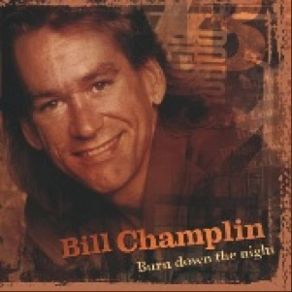Burn Down the Night
Download links and information about Burn Down the Night by Bill Champlin. This album was released in 1992 and it belongs to Rock, Pop genres. It contains 10 tracks with total duration of 49:55 minutes.

|
|
|---|---|
| Artist: | Bill Champlin |
| Release date: | 1992 |
| Genre: | Rock, Pop |
| Tracks: | 10 |
| Duration: | 49:55 |
| Buy it NOW at: | |
| Buy on iTunes $5.99 | |
Tracks
[Edit]| No. | Title | Length |
|---|---|---|
| 1. | Highest Stakes | 4:27 |
| 2. | The Thunder | 6:32 |
| 3. | For Less Than a Song | 4:21 |
| 4. | Headed for the Top | 4:30 |
| 5. | When Love Comes Around | 4:57 |
| 6. | Still Worth Saving | 4:08 |
| 7. | Same Old Song | 5:45 |
| 8. | In Love Too Long | 4:38 |
| 9. | First and Last | 4:43 |
| 10. | Fly By the Light | 5:54 |
Details
[Edit]Bill Champlin has made his mark in music largely as a member of the groups the Sons of Champlin (1965-1977) and Chicago (since 1982). But he has also been a singer and musician for hire, with sideman credits on numerous albums and lots of other moonlighting work. In the late '70s and early '80s, in between his band affiliations, he even made a couple of solo albums, and his solo career was reawakened, offshore anyway, when "The Night," a song he cut for a Japanese commercial, became a hit in Japan, leading to the Far Eastern release of a 1990 EP, No Wasted Moments. Now, another Japanese firm has financed a whole Champlin album (which he has licensed to companies in other countries, including the independent label Turnip the Music Group in the U.S.). Burn Down the Night, originally released in 1992, may come as a surprise to the relatively few fans who have heard his first two solo discs, not to mention those psychedelic stalwarts who followed the Sons of Champlin. Working with co-producer Greg Mathieson, who also co-wrote some of the material, Champlin came up with a much more substantive batch of songs and performed them in a synth rock style that has some elements of his characteristic white soul approach (especially in his always expressive vocals), but aims for a contemporary sound. The ten-song collection basically breaks down into three groups of three, plus a climax. In the first three songs, Champlin is concerned with philosophical and political matters. "Highest Stakes" is a tribute to the younger generation, expressing hope that it will clean up the mess left by its predecessors. "The Thunder," a ballad dominated by Champlin's guitar interplay with the Sons of Champlin's lead guitarist, Terry Haggerty, is another, more general song of affirmation and camaraderie. "For Less than a Song," on the other hand, is a political diatribe that indicts a comfortable public for tolerating corruption, a song hard to misinterpret in the 12th year of Republican presidential administrations.
The second group of three consists of songs describing a woman or (more likely) women in the third person. "She," "a Wall Street social climber" in "Headed for the Top," comes in for strong criticism. The "she" of "When Love Comes Around" is depressed, however, and the singer bucks her up. The singer is involved with the "she" of "Still Worth Saving," although he questions that association before coming to the conclusion in the title. The pronouns shift to "you" in the album's third trilogy, beginning with "Same Old Song," which is explicitly addressed to the members of Chicago, but could as easily be self-directed. Champlin joined the band in time for its second popular renaissance in the early '80s, but stayed on to see it become passé, and he clearly isn't happy about it. "Maybe we can last forever," he sings, referencing the title of a Chicago single, "if we close our eyes together." The second and third "you" songs, "In Love Too Long" and "First and Last," are more conventional love songs. The final song, "Fly by the Light," might be classified as another "you" love song, but it is on another level, a more particular statement with more anthemic music, co-written by Champlin and his wife, the singer Tamara Champlin, making for an uplifting finish. Champlin has spent much of his career concerning himself with whether or not to make commercial music. Burn Down the Night isn't uncommercial, by any means, but it is a far more substantial and personal statement than any he has made before, while maintaining the outstanding musical chops he has displayed as a singer and instrumentalist all along.